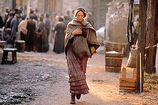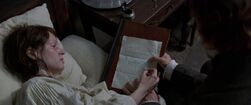| This page uses Creative Commons Licensed content from Wikipedia (view authors). |
Les Misérables is a 1998 film adaptation of Victor Hugo's 1862 novel of the same name, directed by Bille August. It stars Liam Neeson, Geoffrey Rush, Uma Thurman, and Claire Danes.
As in the original novel, the storyline follows the adult life of Jean Valjean (Liam Neeson), an ex-convict (paroled following 19 years of hard labor, for stealing bread) pursued by police Inspector Javert (Geoffrey Rush). It was filmed at Barrandov Studios in Prague.
Plot[]
Jean Valjean (Liam Neeson), a man arrested for stealing bread nineteen years previously, is released on parole. When no one is willing to allow a convict to stay the night, Bishop Myriel kindly welcomes him into his home. Valjean explains to Myriel that sleeping in a real bed will make him a new man. In the night, Valjean, interrupted by Myriel while stealing his silverware, strikes him and flees. When the police arrest Valjean, Myriel tells them that the silverware was a gift and scolds Valjean for failing to take his candlesticks as well. Myriel then reminds Valjean that he is to become a new man.
Nine years later, Valjean is now a wealthy industrialist and a mayor. Fantine (Uma Thurman) is a single mother working at Valjean's factory. Fantine is fired from the factory when her manager learns she has had a daughter out of wedlock. Valjean is too preoccupied with the arrival of Inspector Javert (Geoffrey Rush), who previously served as a guard at the prison Valjean was held in. Fantine, in desperate need of money to pay the extortionate demands of the Thénardiers for looking after her daughter Cosette, turns to prostitution. Javert starts to suspect that the Mayor and Valjean are the same person. Fantine is attacked by some customers, and when she retaliates, Javert beats and arrests her. Valjean insists on her release and she is let go.
Valjean nurses Fantine back, and promises Fantine that she will have her daughter back. However, the Thenardiers continue to extort more money from Valjean and Fantine on accounts of Fantine's daughter being ill. Later, Valjean receives word that another man (John McGlynn) is mistaken as being him and is about to be rearrested. Valjean arrives at court where the man is being tried and reveals his identity that he is the real Valjean. Valjean then returns home and finds Fantine deathly ill. Before she dies, Valjean promises Fantine that he will raise her young eight-year-old daughter, as his own. Javert arrives at Valjean's home to arrest both him and Fantine, and Fantine dies suddenly from shock and illness. Angry, Valjean beats and knocks out Javert and he escapes and flees the community. Valjean eventually finds and rescues Cosette at the Thénardiers, the corrupt innkeepers who were supposed to care for her, but were actually abusing and enslaving her. Both Valjean and Cosette finally make it to Paris where they start a new life together as father and daughter.
Ten years later, Cosette (Claire Danes), now a nineteen-year-old teenager, strongly falls romantically in love with a revolutionist, Marius (Hans Matheson) while cloistered within a religious convent. Meanwhile Javert is now undercover as an insurrectionist trying to undermine the organization to which Marius belongs. In an attempt to finally arrest Valjean, Javert is captured by Marius and is brought to the barricades as a prisoner to be executed. Valjean journeys to the barricades himself when he learns how much Cosette and Marius love each other, intending to convince Marius to return to Cosette. When the soldiers shoot and kill Gavroche (Shane Hervey), a young boy allied with the revolutionists, Valjean uses his influence with Marius to have Javert turned over to him, so that he himself can execute him. Valjean takes Javert to a back alley, but instead of killing him, sets him free. Marius gets shot and Valjean takes him down a sewer. Javert catches them, but agrees to spare Marius. Valjean takes Marius back to his home, also saying goodbye to Cosette. When Valjean returns to Javert, Javert tells him that he is now unable to reconcile Valjean's criminal past with his current lawful existence and the great kindness, generosity, and goodness that Valjean has shown. Stating, "It's a pity the rules don't allow me to be merciful," Javert finally sets Valjean free, shackles himself, adding "I've tried to live my life without breaking a single rule," and throws himself into the Seine thus taking his own life. Valjean walks down the empty street, finally a free man, with a smile on his face.
Cast[]
- Liam Neeson as Jean Valjean
- Geoffrey Rush as Javert
- Uma Thurman as Fantine
- Claire Danes as sixteen-year-old Cosette
- Mimi Newman as young six-year-old Cosette
- Hans Matheson as Marius Pontmercy
- Jon Kenny and Gillian Hanna as the Thénardiers
- John McGlynn as Carnot
- Shane Hervey as Gavroche
- Lennie James as Enjolras
- Sylvie Koblizkova as Éponine
Differences from the novel[]
- The film greatly reduces the roles of many of the characters in the novel, especially the Thénardiers, who are only seen when Valjean buys Cosette from them.
- Cosette's age as a child is changed from eight years old to six.
- Éponine does not play a major role in the film. She and her sister Azelma only appear in one scene together as children playing at a table in the Thénardier Inn, whilst Cosette makes stockings for them, as their mother calls their names.
- Marius' role is changed from reluctant participant in the Uprising to its principal leader, resulting in Enjolras' role also being changed and reduced.
- The subplot involving Marius' political shift is omitted.
- Valjean's theft from Petit Gervais is omitted.
- Many names have been changed. In the novel, Valjean is the mayor of Montreuil-sur-Mer, called Vigau in the film. The man he saves after the cart crash is called Fauchelevent in the novel, Lafitte in the film. The man mistaken for Valjean is called Champmathieu in the novel, Carnot in the film, and the prisoners identifying him are Brevet, Chenildieu and Cochepaille in the novel; the film only changed the last two names to Lombard and Bertin.
- Jean Valjean is functionally illiterate in the film, but can read in the novel.
- Many of the events surrounding the strong and close romance between Marius and Cosette are removed, as is Marius and the Thénardiers living in the same apartment house; the events involving Éponine; the events involving Gavroche; and most of the events involving the Uprising.
- In the film, Valjean slaps Cosette, which he never did in the novel. In the same scene, Valjean also confesses his past to Cosette, while in the novel he reveals this to Marius, begging him not to say a word to her.
- Valjean does not die at the end of the film as he does in the novel; the film closes with him walking away smiling from where Javert threw himself into the Seine, free from the "shadow of the past" that the Inspector represented. This eliminates all events in the novel following Javert's suicide, including the wedding of Marius and Cosette and the two eventually saying their last heartfelt farewells to the dying Jean Valjean on his deathbed.
Release[]
Critical reception[]
The film received a 74 percent "Certified Fresh" rating on Rotten Tomatoes; the consensus states "This intelligent, handsomely crafted adaptation of Victor Hugo's classic novel condenses the story's developments without blunting its emotional impact."[1]
Box office[]
The film opened at no. 4 in its opening weekend with $5,011,840 behind He Got Game, City of Angels, and The Big Hit;[2] the film would eventually gross a domestic total of $14,096,321.[3]
References[]
External links[]
- Wikiquote: Les Misérables (1998 film)
- IMDb
- All Movie
- Box Office Mojo
- Rotten-Tomatoes
- Les Misérables at the Arts & Faith Top100 Spiritually Significant Films list
Template:Bille August
Template:Les Misérables






































